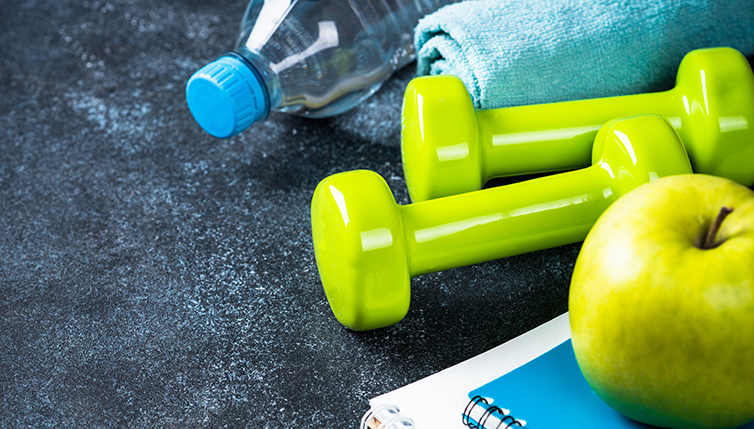No more morning commute. No more annoying co-worker sitting at their desk eating a tuna sandwich. Extra quality time with your family members. Those reasons alone might make staying home appealing for many.
Yet, after several weeks of staying home, the allure may be wearing off, and the stress of the COVID-19 pandemic may be getting to you.
You're not alone. The challenging situation and the unknown future are enough to make even the most stoic human a bit anxious.
Thankfully, there are a number of things you can do to reduce your stress amid the situation.
Find the Facts
The COVID-19 pandemic is a scary situation, but being informed is a great way to keep yourself from panicking.
The Centers for Disease Control and Prevention notes that sharing facts about the coronavirus and understanding the risks are essential pieces to making the situation a bit less stressful for everyone.
While there is a lot of information circulating about the coronavirus, you can't always trust what you read or watch on the internet.
To ensure you're receiving accurate information, follow approved government agencies for details on the virus, including the CDC and the coronavirus.gov website.
Information Overload
Again, there is a wealth of information and stories on the internet or the television-related to COVID-19. That alone can be a bit overwhelming, leading many to stress even more about the situation.
To reduce these stressors, pick one or two reputable news sources - maybe one local and one national - to follow for updates on the virus.
Also, consider limiting your time on social media. It's a great way to keep in contact with your friends and family, but the constant flow of information and personal posts can be overwhelming and stressful.
Help Others
One way to help reduce your stress is to help others. Reach out to your loved ones and friends frequently. Ask how they're handling the situation or, if you're able, see if you can do their grocery shopping or other essential errands.
While you might not be able to see your loved ones in person, staying connected through video chats, phone calls, or mailing letters can help alleviate a sense of loneliness or isolation for all parties involved.
Find A Routine
After several weeks at home, you might find yourself in what appears to be a new routine. Maintaining a bit of structure, even one that reflects your old routine can keep you active and engaged.
Make sure you wake up and go to bed around the same time, eat a healthy meal, and get ready in the morning like you normally would.
A small semblance of your past "normal" can help you feel a little less aloof during these unknown times.
Talk To Your Kids
While the current situation can be stressful for an adult, it can be even more upsetting for teens and kids. Without the routine of school or the option of hanging out with their friends, kids may feel a bit lost.
According to the CDC, children, and teens react to what they see from the adults around them. If you can deal with COVID-19 calmly and confidently, it can provide the best support for your children.
The CDC recommends discussing the situation honestly and reassuringly with your children. Let them know they are safe, and you're here to support them. Additionally, make sure you're modeling positive behaviors by taking care of yourself.
Get Some Fresh Air
Being cooped up in your home with your kids, spouse, work, or even by yourself can be a bit draining.
While you should remain mindful of social distancing, it's okay to get outside for a short amount of time. Of course, this will depend on where you live and the restrictions currently in place.
Consider going for a walk around your neighborhood or working in your garden, if you have one. A bit of fresh air can help clear your mind and alleviate stress.
Get Some Exercise
Get up and get moving. Finding a little time each day to exercise, whether that's a walk around the block or an at-home workout, can be a great way to clear your mind.
Not to mention the endorphins released while exercising can do wonders to de-stress.
Take A Little "Me" Time
An at-home manicure or 10 minutes with a face mask can be a rejuvenating experience while stuck at home.
If a little self-pampering isn't your style, consider taking an hour to start reading a new book or complete a crossword puzzle.
Break out your favorite old CDs or that yearbook. Keeping your mind busy, but off COVID-19, can be a great stress reliever.
Spring Clean
Take a bit of time each day to reorganize or clean an area of your home. Less clutter often translates to a less anxious demeanor.
Walking into a clean, organized room can be a great feeling. Additionally, cleaning can be a form of medication for many.
While cleaning or de-cluttering, be sure to set aside your gently used items for donation. Though many places like Goodwill and the Salvation are not open to the public currently, they'll reopen soon and be ready to accept your donations.
Take Care Of Your Mental Health
If you feel the stress getting to you, call your mental health professional and continue your usual treatment.
Be sure, though, to report any new symptoms or changes in your mental health to your professional to ensure your treatment plan is still right for you.
If you don't already see a mental health professional but feel you might benefit from one, there are several virtual options during this time. The CDC recommends calling the SAMHSA helpline at 1-800-985-5990.
There are no doubt countless other ways to de-stress while at home during this time, but the above options are a great starting point.



 Everything You Need to Know About Teladoc
Everything You Need to Know About Teladoc
 How Important is Dental Insurance?
How Important is Dental Insurance?
 Pre-existing Conditions and Short-Term Medical
Pre-existing Conditions and Short-Term Medical
 5 Easy Exercises You Can Do at Home!
5 Easy Exercises You Can Do at Home!
